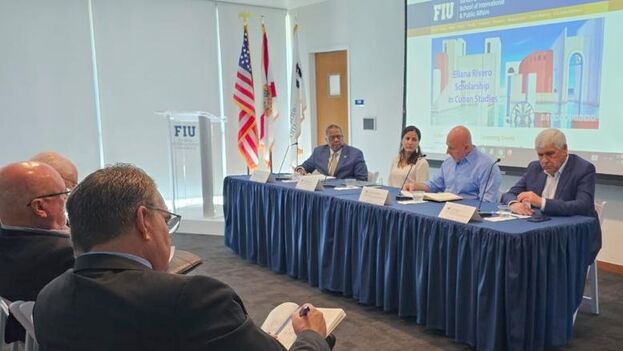
![]() 14ymedio, Miami, 10 March 2023 — “Although we firmly oppose forced exile, the United States will not turn its back on political prisoners, and if they want to come to the United States, we will explore the avenues available under US law to welcome them.” The Undersecretary of State for Western Hemisphere Affairs of the United States, Brian Nichols, expressed himself forcefully at Florida International University, in Miami, where on Tuesday he met with members of the Cuban-American community to present the policy towards the Island by the Joe Biden Administration.
14ymedio, Miami, 10 March 2023 — “Although we firmly oppose forced exile, the United States will not turn its back on political prisoners, and if they want to come to the United States, we will explore the avenues available under US law to welcome them.” The Undersecretary of State for Western Hemisphere Affairs of the United States, Brian Nichols, expressed himself forcefully at Florida International University, in Miami, where on Tuesday he met with members of the Cuban-American community to present the policy towards the Island by the Joe Biden Administration.
In his speech, published on the website of the US Embassy in Havana this Wednesday, the official assured that “publicly — and privately in conversations with Cuban officials — the United States Government continues to call for the release of political prisoners, and we always emphasize that the Cuban people must be able to choose where to live and the Government must allow its citizens to return to Cuba.”
Nichols emphasized that “the economic situation is even worse than that of the so-called Special Period of the 90s, and the human rights situation is more bleak than it has been in decades.”
The “feeling of desperation and the longing for greater freedoms,” Nichols noted, led to the July 2021 demonstrations, which were answered by the regime “with the characteristic repression, sentencing hundreds of protesters to prison with sentences of up to 25 years.”
The repression in the almost two years since those “historic protests,” the undersecretary insists, has doubled, and “more than 700 demonstrators are among the more than 1,000 political prisoners who remain behind bars today.”
With their families and with the “dissident community” of the Island, says the official, the U.S. Embassy maintains “constant communication.” “They are a group of incredibly brave people, who face extremely difficult conditions,” praises Nichols, who outlined the two “key aspects” of the current Administration in Washington.
The first is to “promote accountability for human rights abuses,” and the second, “to explore significant ways to support the Cuban people while limiting the benefits for the Cuban regime.”
Among the first objective are the “selective sanctions against officials and security forces involved in abuses related to the July 11 [2021] protests and visa restrictions on officials involved in attempts to silence the voices of the Cuban people.”
Within the second, for example, support for “family reunification through legal migration,” alluding to the humanitarian parole launched at the beginning of this year and that, also aimed at Venezuelans, Nicaraguans and Haitians, allows up to 30,000 of those migrants to enter legally if they have a “sponsor” who supports them financially and covers their health expenses for two years. “To date, about 10,000 Cubans have successfully used the program to enter the United States,” he explains. “Cubans have benefited from all conditions, including members of the human rights community.”
Since the implementation of this permit, he explains, “the number of Cuban migrants attempting a dangerous irregular migration has plummeted.”
Nichols also referred to other measures by the Biden government, such as flights between the United States and cities outside Havana, which operate for the first time since 2019, and the elimination of the limit on remittances, whose “direct flows” resumed in November 2022, after being suspended for two years.
In addition, he stressed that they are “exploring the expansion of access to cloud-hosted services and other development tools for the Cuban people.” These tools, he explains, “will help activists and civil society connect with each other and facilitate the flow of information on and off the Island. They will also help the Cuban people to access more services, including those that circumvent censorship.”
The undersecretary had words for the current inflation and the chronic shortage of food, medicines and electricity that Cuba suffers. “The Cuban government rushes to blame others for its economic ills without recognizing the decades of mismanagement that led to the current crisis,” he said, alluding to the US embargo, which Havana waves like a flag to justify all its failures. “We continue to ask the Cuban Government to implement economic policies that improve the situation in the country, such as greater freedom for private sector agents and the much-needed agricultural reforms.”
While these measures are being applied, Nichols said, “we will continue to ask the Cuban regime to respect the human rights and fundamental freedoms of all Cubans and unconditionally release all political prisoners.”
Translated by Regina Anavy
____________
COLLABORATE WITH OUR WORK: The 14ymedio team is committed to practicing serious journalism that reflects Cuba’s reality in all its depth. Thank you for joining us on this long journey. We invite you to continue supporting us by becoming a member of 14ymedio now. Together we can continue transforming journalism in Cuba.
